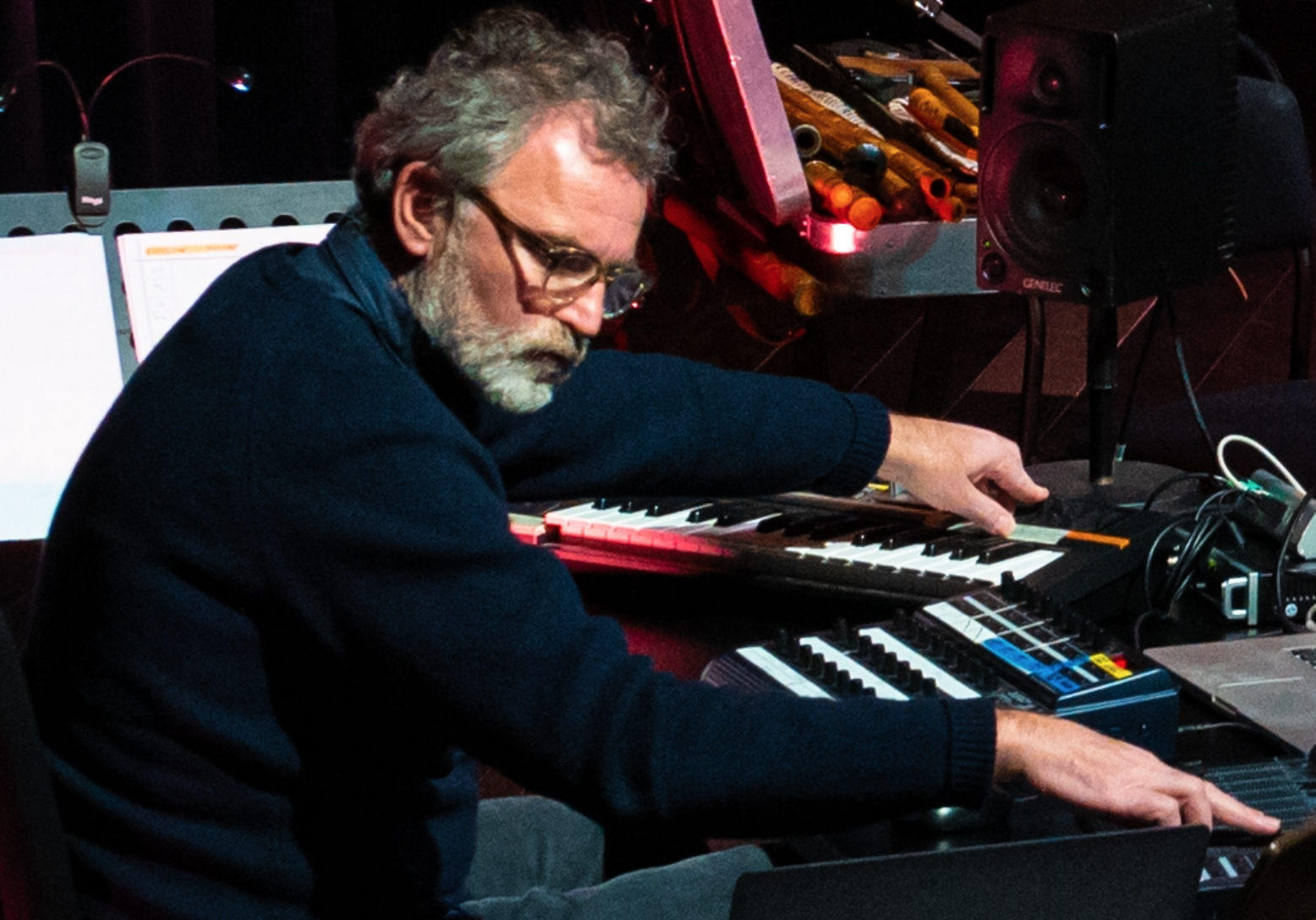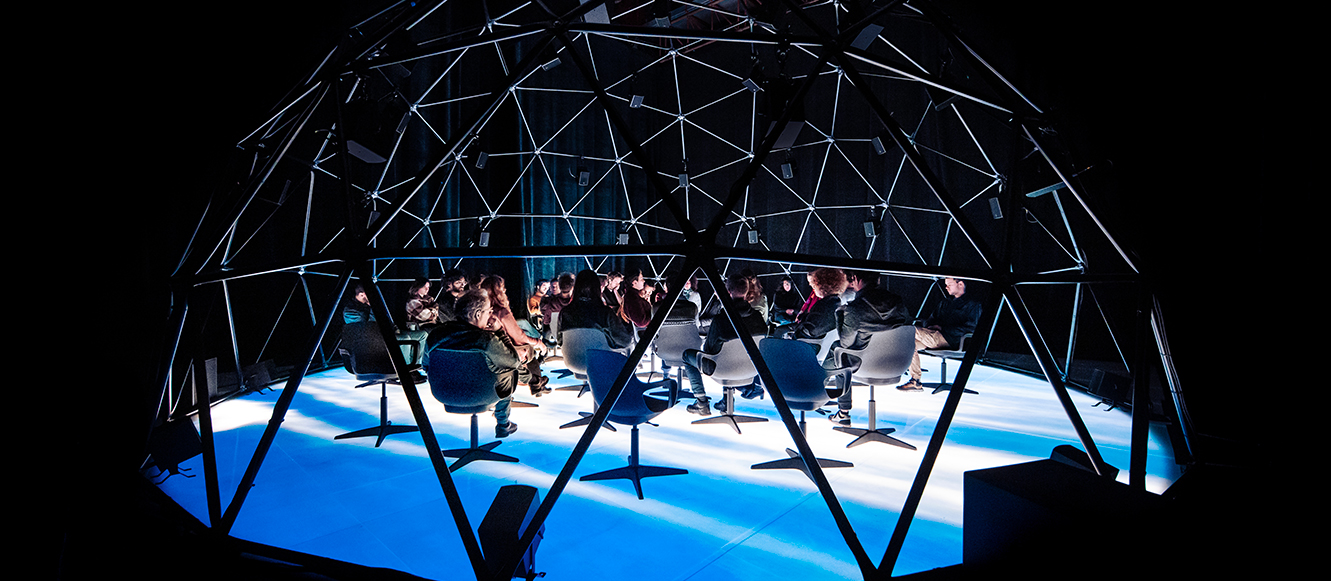Launched in 2020, Ircam's Musiques-Fictions collection offers a unique literary and sound experience, combining a contemporary text with a musical creation, in an immersive broadcasting system.
Installed under Ircam's 49-speaker ambisonic diffusion dome, reconstituted in the GMEM Module, the listener is invited to listen to a sound environment with extensive expressive possibilities, reproducing a listening situation close to that of the real world, from the great spectacular stage to the most minute details of intimate discourse.
These Musiques-Fictions contribute to a profound renewal of the genre of radio fiction, of the Hörspiel, by going beyond the simple sound illustration of narrative or dialogue, when the image no longer acts as a screen.
These Musiques-Fictions contribute to making voices and perceptions heard, creating new spaces for collective and intimate listening and resonance, which have been lacking since the disappearance of literary salons, public reading spaces, wakes and places specific to oral literature (storytellers, griots...).
-
We love cars because they give us the freedom to move around, but we hate them because they break us and our lives. The automobile is an ambivalent object, occupying our imaginations whether we like it or not, and polluting our visual and acoustic environment. The car is a source of traumatic memories (crashes and carcasses) or of family vacations.
From generation to generation, the metamorphoses of these gleaming, metallic bodies have accompanied our advancing years. Cars date.
Olivia Rosenthal, Christian Sebille and Célie Pauthe decided to tell this story, which is at once intimate, social and generational, from the DS of the 60s to the automated Tesla that will soon rule our journeys. Using the listening device provided by Ircam, they created an immersive universe of voices, rhythms, shocks, sounds and memories of accidents. By weaving together words, noises, ritornellos and other musical effects, they reveal the complexity and richness of what binds us to the car.
Production
Ircam - Centre Pompidou
Coproduction
GMEM - Centre national de création musicale
In partnership with
la Friche la Belle de Mai

Christian Sebille is a composer and artistic director of the GMEM in Marseille. He works on the realization of sound installations in situ, in particular within the framework of a series entitled Miniatures. The place of sound capture is linked to the place of its diffusion in a ratio of space compression (reduction of the diffusion space in relation to the capture space) and temporal reduction (ratio of capture time / diffusion time). Moreover, he works on the concrete sound and on the capacity of the material to be in itself its own diffuser (the instrumental object). The radiation of the material and the movement of the object (sound) play with each other.
Olivia Rosenthal
French writer, novelist, playwright and performer
Olivia Rosenthal has published a dozen stories, including "Éloge des bâtards" (Verticales, Prix Transfuge 2019), "Toutes les femmes sont des aliens" (Verticales, 2016), "Mécanismes de survie en milieu hostile" (Verticales, 2014), "Une femme sur le fil" (Verticales, 2025). She won the Prix du Livre Inter and the Prix Alexandre-Vialatte for "Que font les rennes après Noël?" (Verticales, 2010) and the Prix Wepler-Fondation La Poste for "On n'est pas là pour disparaître" (Verticales, 2007). Winner of the Villa Kujoyama in 2018, she published "Un singe à ma fenêtre", the book resulting from this three-month residency in Japan, in September 2022 (Verticales).
Performer and playwright, Olivia Rosenthal writes for the theater and takes to the stage herself to present hybrid forms with artists from all disciplines.
Performances ("Macadam animal", conceived with composer and video artist Eryck Abecassis), opera libretto ("Safety First", again with Eryck Abecassis), sound pieces, musical readings (with Bastien Lallemant, among others), performed lectures, short fiction films (with Laurent Larivière), she also makes various interventions (posters, frescoes) in the public space, all ways for her to renew and multiply the forms that literature can take.
Célie Pauthe
Stage director
Initially an assistant director (Ludovic Lagarde, Jacques Nichet, Guillaume Delaveau, Alain Ollivier, Stéphane Braunschweig), in 2001 she joined the Unité nomade de formation à la mise en scène at the CNSAD.
Célie Pauthe directs texts by Heiner Muller ("Quartett"), Thomas Bernhard ("L'Ignorant et le Fou"; "Des Arbres à abattre"), Henry James and Marguerite Duras ("La Bête dans la jungle" followed by "La Maladie de la mort"), Christine Angot ("Un Amour impossible") and Maeterlinck ("Aglavaine et Sélysette"). She presents Racine's Bérénice, accompanied by a short film by Marguerite Duras, "Césarée". Célie Pauthe has just directed Shakespeare's "Antony and Cleopatra". For several years now, alongside her creative work, she has been teaching young actors at various French theater schools (Ensatt, Esad, Erac). She directed the Centre dramatique national Besançon Franche-Comté from 2013 to 2024.
Johannes Régnier
Computer music director
Currently, Johannes Régnier is a computer music designer at Ircam (Institut de recherche et de coordination en acoustique / musique), and a research associate at the Fraunhofer Institute for Telecommunications, Heinrich-Hertz Institute, HHI, Vision and Imaging Technologies department. He also teaches regularly at Ircam, and occasionally at Berlin University of the Arts.
Friche la Belle de Mai (the Module)
41 Jobin Street13003
Marseille
!! SOLD OUT (6:30 & 8:30 pm)
RATES
Full: 8€
Reduced: 6€ *
* Young people aged 12 - 25, students, jobseekers, recipients of minimum social benefits, intermittent workers, senior citizens aged 65 and over - with proof of age.
Pass Musiques-Fictions * : 10€
* (giving access to two sessions in the same evening Musique-Fiction 1 + Music-Fiction 2)
DURATION
50 min. approx.
Olivia Rosenthal
text and voice
Christian Sebille
music
Célie Pauthe
direction
Johannes Régnier
computer music production Ircam
Oscar Ferran
sound engineering
music recorded by
Quatuor Tana




